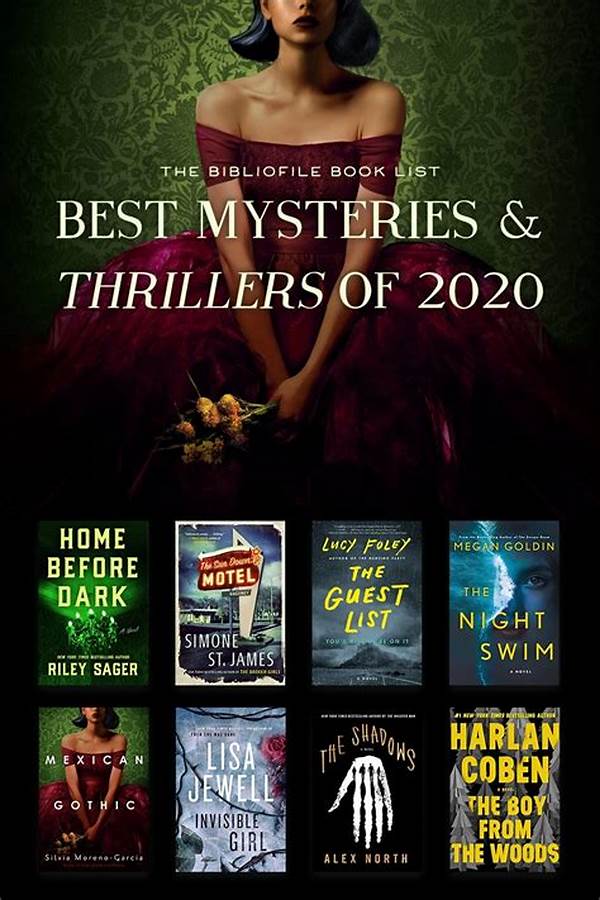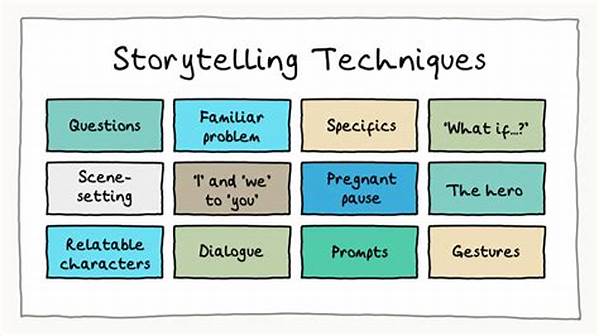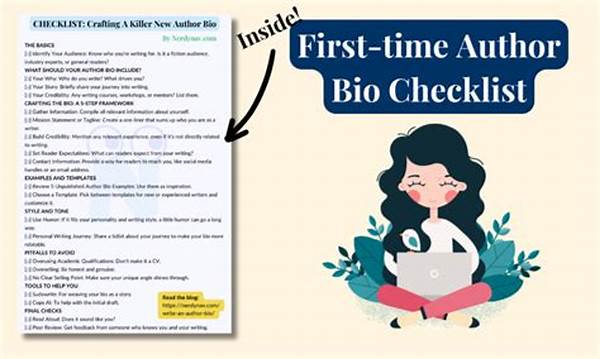Picture this: the year is 2025, and the literary world is in a frenzy. Hovercars zip past massive billboards touting the latest in tech-enhanced storytelling, while virtual reality book clubs gather in digital spaces to discuss the latest reads. Amidst this whirlwind of innovation, the genre of mystery novels has found a new stride, embracing both advanced technology and intricate storytelling that holds readers in thrill and suspense. The allure of “future mystery novels 2025” lies in their ability to combine the eerie charm of the unknown with the mind-boggling possibilities of the future, crafting narratives that are as enigmatic as they are compelling.
Read Now : In-depth Book Club Meeting Guide
The Rise of Tech-Savvy Detectives
In the ever-evolving realm of “future mystery novels 2025,” the detectives are no longer just gumshoe sleuths with a knack for observation. They’re equipped with AI-enhanced cognitive abilities and drones for cyber-surveillance, making them the Sherlocks of tomorrow. In these narratives, technology plays both friend and foe. On one hand, advanced gadgets and AI-driven intuition aid the pursuit of justice; on the other, they pose moral dilemmas for characters navigating ethical gray areas. Imagine a plot where a detective’s reliance on artificial intelligence becomes his greatest vulnerability—a tantalizing twist that keeps readers at the edge of their seats. The interplay between humanity and technology forms the heart of these stories, raising questions that resonate deeply with our own time. “Future mystery novels 2025” are a mirror reflecting our anxieties and aspirations, all wrapped up in tantalizing whodunit thrillers that never fail to engage.
The Slang Game in 2025 Mysteries
1. The term “bot-hunters” refers to detectives using AI gadgets to catch cyber criminals, a common trope in “future mystery novels 2025.”
2. “Info-thieves” are the protagonists’ main nemeses, cyber-criminals who hack personal memories stored in the cloud—a rampant theme in “future mystery novels 2025.”
3. “Holomessages” refers to holographic communications, bringing new layers of deception and intrigue in “future mystery novels 2025.”
4. “Memory dives” describe the act of exploring stored memories for clues, a risky venture often seen in “future mystery novels 2025.”
5. “Aug-glasses” are augmented reality spectacles aiding detectives, adding layers of perception in “future mystery novels 2025.”
Linguistic Innovations in Mystery Novels
The “future mystery novels 2025” don’t just explore technological advancements; they invent a whole new lexicon, a slang-infused dialect that paints the vibrant tapestry of their narratives. Authors creatively incorporate futuristic slang that simultaneously grounds the story and propels it into uncharted territories. This inventive language reflects the characters’ inner worlds and external realities, offering readers a more immersive experience. Words like “bot-hunters” and “info-thieves” aren’t just trendy—they’re essential to the plot, crafting a linguistic landscape that feels both alien and familiar.
In these stories, words are more than mere communication tools; they become symbols of status, power, and resistance. The linguistic inventiveness in “future mystery novels 2025” does more than entertain—it challenges readers to adapt, decipher, and immerse themselves in a futuristic world with ease. This stylistic choice makes the genre more engaging, adding depth and intrigue as readers untangle webs of deception and dissonance, piecing together truth from carefully crafted linguistic lies.
Unraveling the Future Mystery
In the captivating world of “future mystery novels 2025,” the intertwining of slang and narrative serves as a catalyst for thrilling storytelling. Each term slinging around the pages holds multifaceted meanings, urging readers to look beyond the obvious. Slang in these futuristic tales isn’t just jargon; it’s the characters’ way of defining their realities, hinting at societal changes, and signaling ideological divides.
1. The slang “deep-dive” could reference intense investigations or virtual explorations of suspects’ digital lives.
2. “Glitch” might denote unexpected plot twists or setbacks in tech-dependent scenarios.
3. “Neo-snoopers” are PI’s armed with nano-drones, mastering the craft of stealth.
4. The phrase “on the grid” now points to online identities, marking territories of public vs. private life.
Read Now : Challenging Queries To Consider
5. Shoot dice with fate—this phrase alludes to risky gambits characters embark upon in high-stake mysteries.
6. “Byte trails” symbolize the digital breadcrumbs left by suspects.
7. “Echo reflections” involve analyzing AI simulations for case breakthroughs.
8. Calling a twist “next-gen” adds an air of avant-garde innovation to the storyline.
9. “Shadowhackers” refer to antagonists who exploit virtual enclosures.
10. “Data-shufflers” hints at someone adept at fabricating info to alter narrative directions.
Encompassing Futurescapes in Fiction
The year 2025 serves as a canvas for authors painting expansive visions that blend reality with speculative creativity. In “future mystery novels 2025,” the art of weaving intrigue goes hand-in-hand with building a world where slang functions as cultural shorthand, carrying deeper meanings than at first glance. Through fervent exchanges between characters laden with unique vernacular, readers are swept into realms where language adapts to fit a rapidly changing paradigm, crafting riveting escapades in the process.
Characters in these books navigate cities bursting with tech marvels—hover traffic is jammed, neon signs blink messages that alter upon recognizing passerby’s biometrics. Amid this, the colloquial language acts like linguistic graffiti—youthful, rebellious, and incisive. Its role is pivotal, not only for its flavorful infusion of authenticity but for carrying subtext that can fold in and out of the main plot like quantum echoes—simultaneously existing, foreboding, and hinting at the crux that lies beyond the immediate. As narratives unravel, the clever use of slang in “future mystery novels 2025” becomes integral, shaping character dynamics, driving action, and coloring contexts with nuanced undertones.
Slang’s Evolutionary Path in Narratives
Across the expanding vistas of “future mystery novels 2025,” slang evolves into an entity that feels evolutionary. Characters wield it like a cultural currency, its usage hinting at allegiances, identities, and hierarchies within fictional societies. Slang, in this scope, acts as more than mere zest to dialogue—it forms the bedrock of interaction, a transactional language through which power, secrets, and truths are exchanged. As stories twist and turn, the selective dropping of future-centric slang reveals layers readers never expected, flipping theories and recalibrating mysteries.
The evolution is marked by familiarity and innovation, borrowing from existing language trends while morphing into something new—distinctive yet recognizable. Readers encounter an amalgamation where today’s jargon meets hypothetical future-speak, drawing them into speculative scenarios made relatable through the lens of popular lexicon. Such creative linguistic landscapes reflect societies in flux, echoing the continuous evolution we experience as language is shaped by culture, environment, and innovation. The symbiotic dance between narrative and slang in “future mystery novels 2025” promises readers an engrossing literary adventure, filled with crisscrossing trails of mystery, humor, and social commentary.




